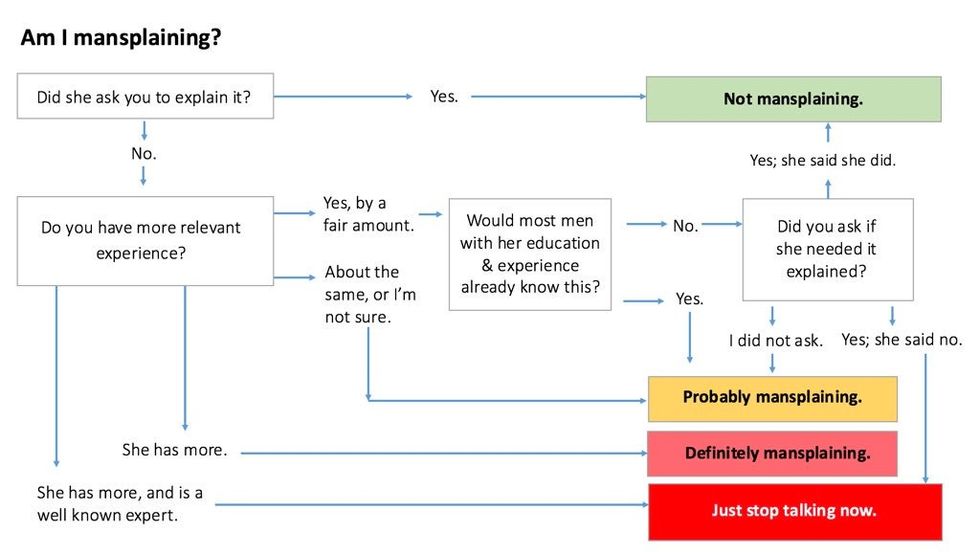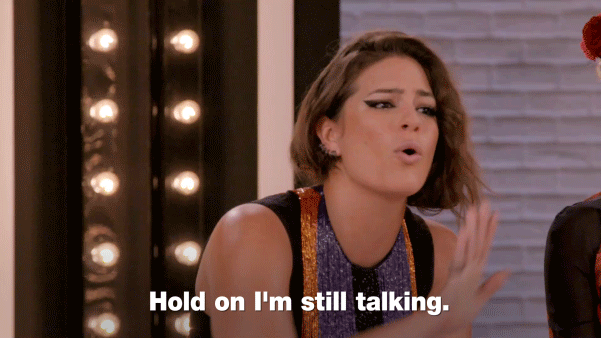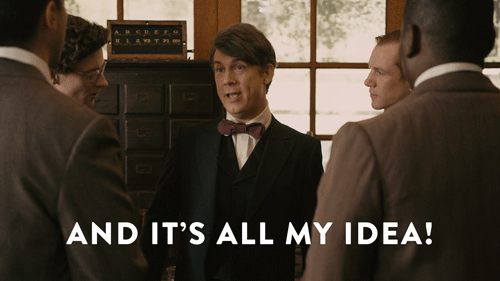I had a conversation with my brother-in-law at a party over a year ago. We were talking about the treatment of minorities in our country, and we eventually turned to how he was starting to recognize how women aren't treated as equals, especially in his workplace.
I'll never forget the earnestness on his face when he said, "I don't know how to help them, but I wish I did."
We've had many conversations since about the plight of women and how he, as a privileged male, can use his influence to empower us. I know not everyone is as fortunate.
This is the ideal situation—to have a man recognize problems, genuinely ask for your opinion and advice, and seek to make the world a better, safer place for women. The more standard one is when we try to talk about what we face and immediately get shut down.
"Not all men!"
"I don't think that happens as often as you think. I've never seen it."
"You sound like a feminazi..."
"Do you hate men or something?"
No, I don't hate men, I believe in equality and not putting an entire gender in a concentration camp, it does happen very often, and enoughmen are like that, which is the problem.
I'm not accusing each and every man of being a rapist, abuser, or oppressor. I'm trying to tell you that as a woman in this culture, I don't feel safe or as valued as men.
Being a woman means being taught growing up that I must always have a buddy with me wherever I go, even if it's to the bathroom; that I shouldn't run up to Wal-Mart or walk to my car alone at night; that I can't be alone with any repairman in my house; that I have to watch how I dress or interact with guys because they may take it as an invitation; that I can't leave my drink unattended unless I want to be roofied; that I need to carry mace with me or at the very least hold my car keys between my fingers; that I have to check the back seat of my car and underneath it before getting in.
Being a woman means having ingrained in me from a young age that I must do everything in my power not to be raped.
If that's not the kind of world you want to live in, there are changes we can make beyond simply teaching our sons not to rape (though for the love of all that is good and holy, if you're going to teach little girls to not be raped then you better be teaching little boys to not take advantage of women).
Creating a culture wherein women feel safe, valued, and like men's equals start with some smaller steps.
1. Ask a woman's perspective on what it's like to be a woman in this culture, and seek to understand rather than defend yourself or men in general.

First things first, you need to actually know where women are coming from. What I shared about living life in an effort not to be raped is only a fragment of my experience as a woman. Each of us is unique and have our own experiences, and you owe it to the women in your life to listen to what they've gone through and what they think needs to change.
And when the conversation inevitably makes you feel uncomfortable—possibly because you've done some of the things she's talking about—swallow any knee-jerk reaction to defend or justify. This is meant to be a conversation, not an argument. You are here to learn how she feels, not to tell her she's wrong.
2. Be open to recognizing that you could in any way be part of the problem and make an effort to change.

If you're wanting to learn how to make the culture better, you have to start with yourself.
You could ask her if you've ever done anything to contribute to her negative experience as a woman. In the very least, listen to what she's saying about how she's been treated, and take some time to reflect and see if you've ever done or currently do even the slightest of things that make it worse.
This might be hard to hear, but chances are that you definitely do some things. And that's just human nature. You're just now learning about this problem that exists, a problem stemming from internalized sexism and misogyny. Meaning you have it, too. But guess what? Everyone has issues like that. The important thing is that you recognize it, then move on to repenting and changing.
3. Compliments are great, but only compliment women on things we have control over.

To clarify, things like clothes, shoes, hair, make-up, tattoos, piercings, etc. are things we have control over. Not our eyes, lips, or figure. Compliment us on the things we choose to represent us.
And take it a step further. Don't limit your compliments to our outward appearances because that can reinforce the idea that our worth lies in how we look rather than in who we are or what we do. Praise our successes and our accomplishments, our work ethic, and our intelligence. There are many other attributes to compliment a person on rather than just their looks.
4. Quit mansplaining. Recognize that women actually know things and explaining without our consent is belittling.

Kim Goodwin created the above chart for any man who isn't sure if he's mansplaining or not.
If you're not sure what mansplaining is, it's basically when you assume a woman doesn't understand something and explain it to her. Unless she asks, don't explain it.
5. If she's being talked over and has given up on being heard, point out that she was still speaking.

This happens a lot in normal conversations; human beings have a tendency to interrupt each other, but women are often interrupted more than men and usually by men. It most likely has to do with the fact that men are raised to be domineering and women to be gentle, and so women allow others to interrupt.
The most empowering way to help a woman come into her own, and the reason why I specifically included "has given up on being heard," is for her to stand up for herself. The most important way to empower a woman who is being talked over is to encourage her to stand up for herself. Give her the time to tell the offending party, "I was still talking."
If, and only if, she's clearly given up on being heard, you may step in and do it for her. As a man, you have a certain privilege that other women don't: men instinctively respect you. Use that to the advantage of the women around you.
It also has been proven to happen in business meetings as well (which really shouldn't be a surprise). The same steps should be taken on your part.
6. If she suggests an idea and another man suggests the same idea but is the one to get credit for it, make sure everyone knows it was her idea originally.

Historically, men have been taking credit for women's ideas and discoveries for a long time. Did you know that Rosalind Franklin was actually the first person to discover the double helix of DNA? No? That would be because she was a chemist studying DNA at King's College, and a colleague showed her Photo 51 to Watson and Crick without her knowledge. That photo of hers was the breakthrough for them. She did the work, they took the credit.
Did you know that a woman created Monopoly? And that women discovered nuclear fissions, pulsars, the opiate receptors in our brains, and that sex is determined by the XX-XY chromosomes? And that women invented computer programming, the radio guidance system, and the paper bag machine?
This habit of men taking women's ideas can happen in the workplace, when you're trying to decide where to eat with friends, and other various situations. Be on the lookout. Make sure each woman gets the proper credit for her ideas, whether it's a marketing strategy or dinner at Chili's.
7. Believe women.

In every sense of the word, in every situation, believe us when we tell you something.
Believe us when we tell you we've been sexually assaulted. Believe us when we tell you we are not treated as equals. Believe women. You shouldn't have to "go undercover as a woman" for a day, dealing with customers from her email, in order to see that we're not treated as equals. You should take our word for it. You need to trust us.
Don't let what happened with Dr. Christine Blasey-Ford and Brett Kavanaugh continue to be the norm.
8. Don't just say, "I'm a nice guy; I don't do that" and start standing up to the men who do. Don't allow jokes, behavior, or comments that demean women or trivialize rape culture.

Rape and abuse don't just spring up out of nowhere. They're allowed because of rape culture.
Marshall University defines rape culture as "an environment in which rape is prevalent and in which sexual violence against women is normalized and excused in the media and popular culture. Rape culture is perpetuated through the use of misogynistic language, the objectification of women's bodies, and the glamorization of sexual violence, thereby creating a society that disregards women's rights and safety."
They also provide bulleted lists that include examples of rape culture and ways we can all combat it, both of which you should definitely read and utilize.
9. Educate the men around you.

It's important for you to change the way you see sexism, rape culture, and the overall treatment of women and for that shift in perspective to affect your behavior. If you're making an effort to learn about this issue of sexism and oppression of women and to change, then it's time to teach others what you've learned. Raise your sons to empower women. Affect change in our culture.
Being a woman in this day and age is scary and difficult. There's definitely been a change and we have more rights than we used to, but that doesn't mean that the mindsets that put those laws into place that kept us from having equal rights have gone away. That's like saying that just because segregation is now illegal and black people have rights, racism is now over. The problem remains, and we all need to work together if we want to see any change.

















